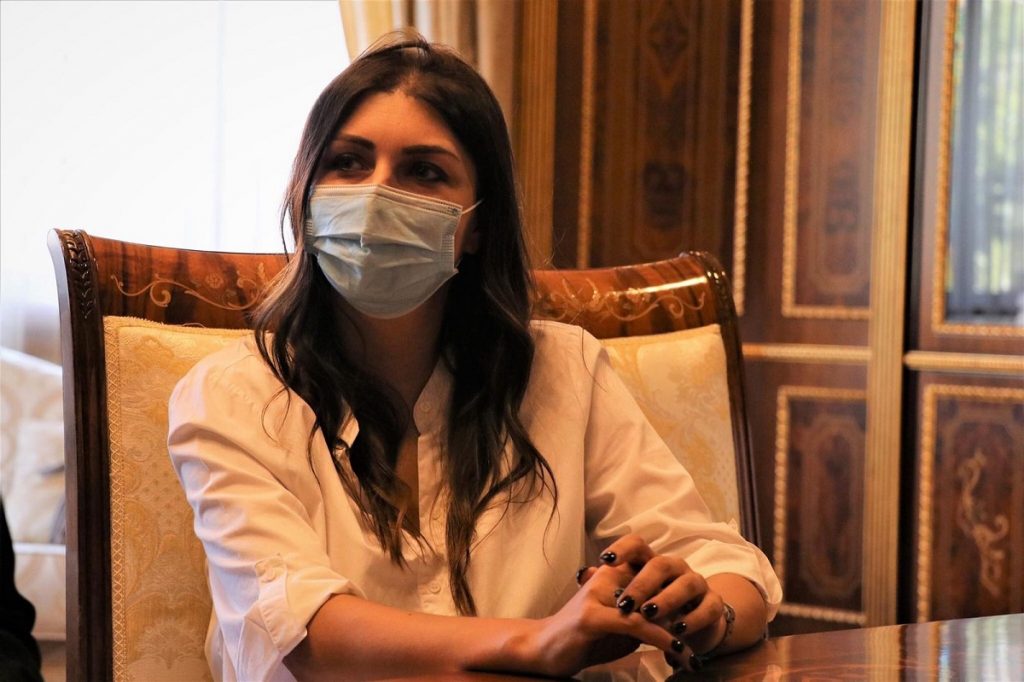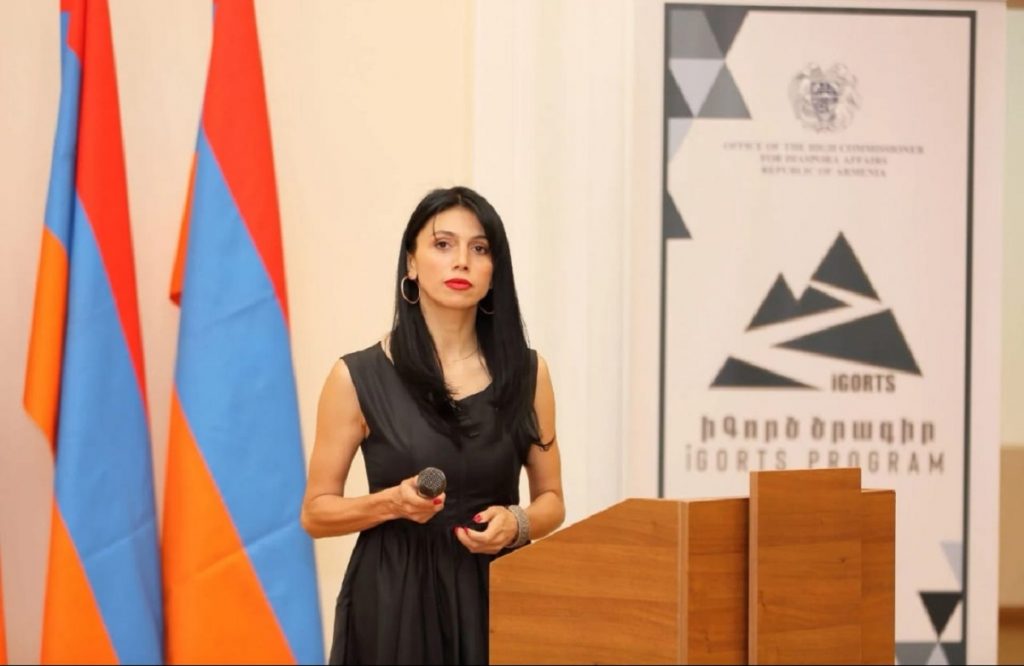Diaspora Armenians in Armenia's civil service - sharing knowledge and skills with homeland
Since 2020, Armenia has been running the “I Gortc” (arm. “for the cause”) program, the main goal of which is to attract the diaspora Armenians residing abroad to the government work. The program is aimed at stimulating a wave of professional immigration of highly qualified specialists.
In Armenia, they always talked about the need to involve foreign Armenians in solving various problems of the country, but the matter did not advance beyond discussions.
With the program “I Gortc”, practically this process began. During the year, the state provides each of the project participants with a monthly salary of 336,000 drams ($700). For many of them, this is a small, one might say, symbolic amount. But some of the participants in the first stage of the project have already settled in their homeland after the expiration of the term of the employment contract.
The stories of the “I Gortc” program participants: who and why comes to work in Armenia, what they want to achieve, why they give up a well-arranged and well-to-do life in other countries and how their life is going on in their homeland.
- Leaving the US for Armenia – four different but similar stories
- Buy Armenian: A start-up launched during the second Karabakh war
- ‘The Future Armenian’ – an action plan to rebuild the country
“Parents, children and homeland are not chosen”
In 2020, on a competitive basis, 52 specialists from 19 countries were selected and received an invitation to work in the public administration system of Armenia for a year.

Journalist and PR specialist Hermine Harutyunyan is one of the participants in the first stage of the program.
She came to Armenia from the Russian city of Chita. She says that she made the final decision to move to Armenia a year before the invitation to work:
“My family emigrated from Armenia when I was 5 years old. 23 years later, in 2019, I came to Armenia, visited Tatev [a settlement in the south of Armenia]. There I thought: why not do what I am doing in Russia in such a beautiful and truly native country? Then I decided that I needed to find a job and finally settle here”.
A year later, within the framework of the “I Gortc” program, Hermine received a job offer in the office of the Chief Commissioner for Diaspora Affairs – as a media expert. It was supposed to start in October 2020 but the Karabakh war began in September.
“In the early days, we were shocked. I was afraid that my father would be against it, but he called and asked: “Are you going?” These words instilled confidence that, yes, I must go as soon as possible”, recalls Hermine.
She got down to work during a tense period of pandemic and war. I had to work almost in extreme conditions. The media team she joined provided 24/7 operational communication with Armenian Diaspora communities around the world.
And after a year of hard work, Hermine decided to finally settle in Yerevan. He says that the past year helped to make sure that the decision was correct:
“I’m calm in my country, I don’t want to go anywhere. They say we don’t choose our parents and children. We don’t choose or homeland either. We just need to live in our homeland, love it and try to make it the way we want it to be”.
Liana Simonyan, head of the “I Gortc” program of the office of the Chief Commissioner for Diaspora Affairs, says that it was not only Hermine who decided to stay in Armenia after the end of her labor contract:
“In 2020, more than 60% of the program participants settled in Armenia. Some of them received offers to work in the public sector, others in the private sector. We expected the repatriation of approximately 15`% of the participants. But the results were several times higher than our expectations. This indicator is the best achievement of the program”.
“Before the war, Armenia was a tourist destination for us”
In 2021, 370 specialists from more than 20 countries applied for participation in the I Gortc program. 50 people were selected. The selection was carried out taking into account the personnel needs of various departments of the public administration system.
This year, the most in demand were specialists in the field of cybersecurity and prosthetics, researchers, diplomats, political scientists, as well as social workers with the skills required to work in a pandemic.

36-year-old political scientist Marianna Shahinyan is one of the participants in the 2021 project.
She has lived in Argentina for more than 20 years, and recently started working in the office of the President of Armenia. She says that she made the decision to work in Armenia after 44 days of the Karabakh war.
“Before the war, we viewed Armenia more as a tourist destination. And helping our homeland for us consisted in donating some sums, transferring them to the account of the Hayastan All-Armenian Fund. And that’s all. And during the war and after it, much became obvious: we realized that Armenia needs us, but on the spot. From a distance, the problems here are not so real”.
Marianna left her 15-year-old twin daughters in Buenos Aires and hopes that in the near future there will be an opportunity to bring the whole family to Armenia:
“I’ve lived my whole life in Argentina. I have everything there – family, work, friends. I left everything and came. The only purpose of my move is to work productively, to be useful”.
Participants in the I Gortc program do not like to talk about the salary they receive at home.
“I think those who are here now did not come for money. In the current crisis situation in Armenia, it is impossible to expect more from the state”, Marianna said.
The specialists involved in the I Highlander project say that they are united by the desire to contribute to the development and prosperity of Armenia. They call on all Armenians in the Diaspora to follow their example – to come and work in their homeland.
“Serious changes are possible when you stand on this land, because the native land gives strength. You can see everything on the spot and understand what to do to achieve success”, says Hermine.
According to Marianna, for a start, it is necessary to forget about the division of Armenians into local and diaspora:
“There are no separate Armenians of the Diaspora and Armenians living in Armenia. There are simply Armenians who must do everything to get the country back on its feet. This is the only way out”.
Next steps
In parallel with the launch of the I Gortc-2021 program, plans for the future are being discussed in the office of the Chief Commissioner for Diaspora Affairs. When asked whether the financing of the project can be increased in order to invite more specialists from abroad to work, the program manager Liana Simonyan finds it difficult to answer.

In any case, steps will be taken to increase interest in the program, to continue Armenia-Diaspora cooperation and professional repatriation.
Meanwhile, specialists living abroad expect the Armenian government to launch more massive programs, which they could join.
A graduate of the University of Texas, pharmacist-pharmacologist Sofia Mnjoyan works in one of the best local medical centers.
She emigrated with her family in the 2000s and believes it is time to return to her homeland:
“Many of us who once left Armenia must leave everything and return to our homeland. I know that the government has been implementing the I Gortc program since 2020. But I believe that the number of participants in the program could have been much higher. Instead of 50 specialists, there could be 500 if the state allocated the appropriate funds.
I want to return to Armenia not because after our departure in Armenia something has changed, but in order to change something myself. At least professionally – in the field of health care, as well as in the life of the country as a whole – in the mentality, in people’s approaches to certain issues”.


















